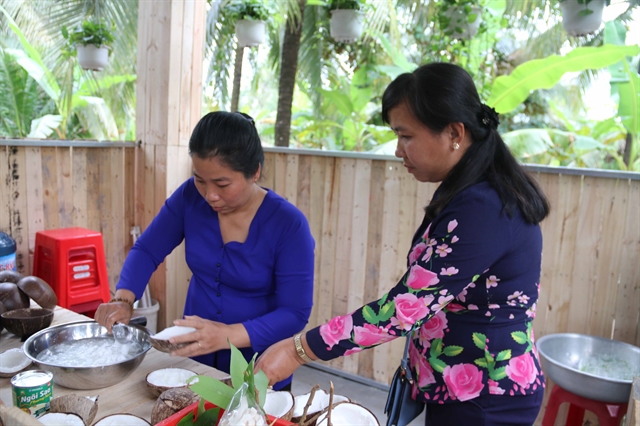 Society
Society

A 28ha sáp coconut grove in the Cửu Long (Mekong) Delta province of Trà Vinh has been granted a Vietnamese good agricultural practices (VietGAP) quality standard certificate.

|
| Making a desert from sáp coconut for tourists in Trà Vinh Province. – VNA/VNS Photo Thanh Hòa |
TRÀ VINH A 28ha sáp coconut grove in the Cửu Long (Mekong) Delta province of Trà Vinh has been granted a Vietnamese good agricultural practices (VietGAP) quality standard certificate.
It belongs to the Hòa Tân Sáp Coconut Co-operative in Cầu Kè District’s Hòa Tân Commune.
Sáp coconut, a specialty with soft, thick pulp, is grown only in Cầu Kè District where the soil is suitable for it. The district has been well known for the coconut for more than 50 years after a local brought the variety from Cambodia and planted it, Nguyễn Văn Sử, the chairman and director of the co-operative, said.
The co-operative’s 53 members grow 45ha of the variety, he said.
The district has more than 1,000ha with 22,000 trees of sáp, including 17,000 trees in Hòa Tân Commune.
A mature tree produces 120 – 150 nuts a year, with only 40 – 50 per cent having soft and thick pulp and being called sáp coconuts, with and the rest having normal flesh.
Farmers can earn an income of VNĐ10 million (US$430) a year from a mature sáp tree.
The coconut is used mostly for desserts like coconut shakes and flesh mixed with milk, sugar and ice.
Recently some candy makers in the district have successfully made delicious jam from sáp coconut, which fetches of VNĐ400,000 ($17,230) per kilogramme.
Since there is high demand for the variety, many farmers in the district have planted it in recent years.
Province authorities have taken many measures to develop the variety, including research and improvement in the quality of seedlings to increase the rate of sáp coconuts that grow in each tree.
Huỳnh Nghĩa Thọ, director of the Co-ordination Board for Adaptation to Climate Change in the Mekong Delta in Trà Vinh Province, said his agency is supporting farmers, especially co-operatives, by teaching them farming techniques, helping build brand names and seeking outlets to improve the value of sáp coconut and their incomes.
Trà Vinh has more than 23,000ha under coconut, making it the delta’s second largest producer after Bến Tre Province.
It has 50 companies and co-operatives that produce coconut milk, coconut oil, charcoal from coconut shell, and coir. — VNS




